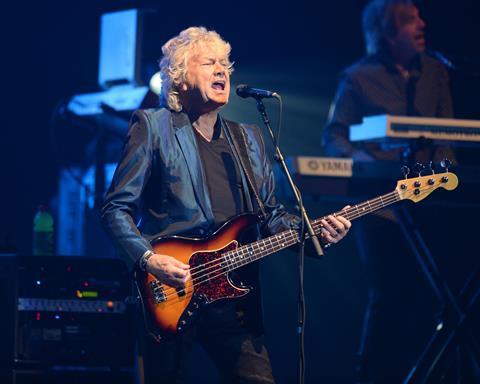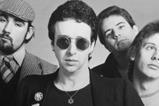Progressive rock pioneer John Lodge has died aged 82. As bassist for the Moody Blues, he reached the peak of rock stardom, selling 70 million albums worldwide and touring the globe, all while remaining grounded in the evangelical faith of his Birmingham childhood, says Tony Cummings

The death of bass guitarist, singer and songwriter John Lodge on 10 October has brought forth obituaries in publications as diverse as Britain’s The Guardian and America’s Charisma magazine.
But for younger Christians, the name of the band with whom John played for several decades — the Moody Blues — remains unknown, as do the musical subgenres – prog rock, symphonic rock, psychedelic rock – that critics down the years have labelled the Moody Blues music.
But to their millions of fans the Moodys were rock gods. A recent internet tribute to this most gifted musician regurgitated a story when John, then a bona fide rock superstar touring the world was inspired to write ‘Isn’t Life Strange’ featured on the Moody Blues’ million-selling album Seventh Sojourn.
In Detroit, at the afterparty of a gig, John entered into a deep and lengthy conversation with a local pastor while his bandmates and a hundred people enjoyed the booze and dope revelry around them. John said of the moment: “I remember us talking about Christianity, amid this party, and I said to him, ‘Isn’t this strange?’”
In 1968, Lodge married his wife Kirsten and subsequently had two children. His commitment to family and faith was lifelong.
Early life and faith
Lodge was born in Erdington, Birmingham in 1943. His father was an engineer and committed Christian and from childhood he regularly attended Sunday School at Birches Green Evangelical Church.
The young Lodge was free to ask questions. He later reminisced, “I grew up through an evangelical church, and the more I talked to people the more I realised all the things I’d learned at church were relevant – and what everyone was looking for. The 60s was a crazy time in rock’n’roll, and you could have really gone to extremes in everything. But I found I had this inner strength that seemed to see me through a lot of things.”
In his teenage years, having become enamoured with the records he listened to on the small Rockola jukebox in a Birmingham café he frequented, he began teaching himself the rudiments of guitar. John was asked by a school friend, harmonica-toting Ray Thomas, to join a local group El Riot & the Rebels. (Thomas was El Riot). The band played mainly covers of R&B and blues songs.
John left the group to study engineering at Birmingham Technical College and the band folded. But while John got to grips with the intricacies of the combustion engine and industrial technology, Ray Thomas started more bands and eventually the Moody Blues came into being.
The rise and reign of the Moody Blues
The new band achieved much – management, a recording contract and the number one hit single ‘Go Now’ (a cover of a Bessie Banks soul song). But the British R&B boom was coming to an end and the record industry was changing. Albums rather than singles were now what was driving the rock music market.
In 1966, a new Moody Blues emerged with original members Mike Pinder (keyboards) and multi-instrumentalist Ray Thomas bringing in Justin Hayward (guitar and vocals), John Lodge (bass and vocals) and Graeme Edge (drums).
Suddenly, thanks to Decca Records’ backing, the band had the creative ability to record an ambitious big budget concept album, 1967’s Days Of Future Passed.
Producer Tony Clarke brought Mike Pinder’s Mellotron (a tape replay keyboard) to the band’s complex and often poetic songs, while classical colourings provided by London Festival Orchestra gave the band an innovative new sound.
Outside of this evolution, everything from pumping rock rhythms to hauntingly delicate balladry was under the creative control of the band’s two lead singers, Hayward and Lodge.
Days Of Future Passed was only a smallish hit on its release and got thumbs down reviews in America but over the next few years received acclaimed as a classic and won a gold disc. And once the Moody Blues toured enthusiastic followers were added daily to their deftly played and sung musical vision.
Huge success came to the Moody Blues. The album On The Threshold Of A Dream (1969), A Question Of Balance (1970), Every Good Boy Deserves Favour (1971) all reached number one in the UK album charts.
By the time they recorded their final studio album, 1983’s The Present on their own Threshold Records label they had clocked up 70 million worldwide album sales with 18 platinum and gold discs.
His legacy
John later pursued a solo career releasing Natural Avenue (1977),10,000 Light Years Ago (2015) and Days Of Future Passed – My Sojourn (2023). Many of John’s songs deal with the relentless passing of time.
He said in an interview, “We use a three-letter word in English that means absolutely nothing, and that word is ‘now’. There is no such time as now, because as soon as you’ve said it, then it is the past.”
John died at the age of 82 at his home in the UK. John’s birth, the Moody Blues’ biggest hits, and now John’s death are all flashing moments of the past. For believers it is a continuing comfort that John has passed into God’s eternal now.






































No comments yet